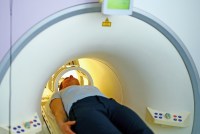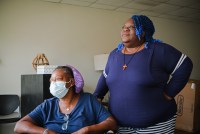Latest KFF Health News Stories
Journalists Look Into Wildfire Trauma and the South’s Monkeypox Response
KHN and California Healthline staff made the rounds on national and local media this week to discuss their stories. Here’s a collection of their appearances.
El regreso de la poliomielitis y la vuelta a clases: lo que debes saber
Ahora que la poliomielitis vuelve a aparecer décadas después de que se considerara eliminada en Estados Unidos, los que no están familiarizados con la temida enfermedad necesitan una guía para protegerse a sí mismos y a sus hijos
New Abortion Laws Jeopardize Cancer Treatment for Pregnant Patients
As abortion restrictions take effect across the South in the wake of the Supreme Court’s decision to overturn Roe v. Wade, cancer doctors are trying to decipher the laws. They’re grappling with how to discuss options with pregnant patients, who may be forced to choose whether to proceed or forgo lifesaving cancer treatments that can prove toxic for the fetus.
With Polio’s Return, Here’s What Back-to-Schoolers Need to Know
Because polio has been vanishingly rare in the United States for nearly a half-century, doctors may not consider it when diagnosing patients with typical symptoms. Here are the signs and the science behind an infectious disease that is largely a mystery to modern society.
A Disability Program Promised to Lift People From Poverty. Instead, It Left Many Homeless.
A federal disability program meant to provide basic income for people unable to work has left many of its recipients homeless. Advocates for the poor say the crisis is growing worse as rents rise and Congress decides whether to make changes to the program that would affect millions of people.
KHN’s ‘What the Health?’: Graham’s Bill Recenters Abortion Debate
Republicans would like to shift the political focus away from abortion to economic issues for the midterm elections, but a bill from Sen. Lindsey Graham (R-S.C.) that would ban most abortions after 15 weeks of pregnancy has put the issue squarely back on their agenda. The proposal was not welcomed by many of his colleagues, especially Minority Leader Mitch McConnell. Also this week, the muddle about where the fight against covid stands and near-record-low numbers of uninsured in the U.S. Rachel Cohrs of Stat, Sandhya Raman of CQ Roll Call, and Margot Sanger-Katz of The New York Times join KHN’s partnerships editor, Mary Agnes Carey, to discuss these issues and more.
Montana Health Department Seeks to Ax Board That Hears Public Assistance Appeals
Applicants for cash, food, and health care assistance would need to go to court to appeal rejections if the Montana legislature approves a proposal to eliminate the Board of Public Assistance.
Court Ruling May Spur Competitive Health Plans to Bring Back Copays for Preventive Services
The Affordable Care Act required that health insurers provide many medical screenings and prevention services at no out-of-pocket cost to health plan members. But insurers and employers may consider adding cost sharing for preventive services now that a federal court ruled the ACA’s mandate is unconstitutional.
Impending Hospital Closure Rattles Atlanta Health Care Landscape and Political Races
The nonprofit owners of Atlanta Medical Center, a 460-bed Level 1 trauma center in the heart of the city, plan to close the hospital in November. As many community members worry about the hole the closure will leave in the city’s safety net, the news has thrust health care into the political spotlight less than two months before Election Day.
Expertos cuestionan el rol de la morera blanca en la muerte de la esposa del congresista
Es una planta que se ha utilizado como remedio herbal durante siglos, y que el botánico consultor del forense llamó “no tóxica” en una carta a su oficina.
Experts Question the Role of White Mulberry in the Death of Congressman’s Wife
The Sacramento County coroner concluded that Lori McClintock, the wife of U.S. Rep. Tom McClintock, died of dehydration after ingesting white mulberry leaf. But some scientists, doctors, and pathologists are questioning that ruling, and are urging the coroner’s office, which hasn’t explained its reasoning, to reopen the case.
Algunos estados permiten que se utilicen en estudios de investigación, a veces por parte de terceros a cambio de una cuota, o que se proporcionen al personal policial que investiga un delito.
California y Nueva York buscan frenar la venta de píldoras para adelgazar a menores
Si ambas medidas se convierten en ley, sus defensores esperan que den impulso a la restricción de la venta de píldoras dietéticas a niños y adolescentes en más estados.
California and New York Aim to Curb Diet Pill Sales to Minors
California and New York would be the first states to require anyone under 18 to obtain prescriptions to purchase over-the-counter weight loss products, which some research has linked to eating disorders.
Southern States’ Lackluster Monkeypox Efforts Leave LGBTQ+ Groups Going It Alone
The gay community is disproportionally affected by the monkeypox outbreak, and the Centers for Disease Control and Prevention says public health efforts should prioritize gay and bisexual men. But in the South, some LGBTQ+ advocates fear that this is not happening consistently. They say they are having to take matters into their own hands in the absence of a coordinated response from state governments.
Newborns Get Routine Heel Blood Tests, but Should States Keep Those Samples?
Shortly after birth, babies are pricked in the heel so their blood can be tested for life-threatening conditions. States generally save leftover blood from those samples, and parents and privacy experts are concerned that information could be used without consent years later.
Medical Coding Creates Barriers to Care for Transgender Patients
The codes used by U.S. medical providers to bill insurers haven’t caught up to the needs of trans patients or even international standards. Consequently, doctors are forced to get creative with what codes they use, or patients spend hours fighting big out-of-pocket bills.
As State Institutions Close, Families of Longtime Residents Face Agonizing Choices
Iowa, under federal pressure to improve care for people with intellectual or developmental disabilities, is set to join 45 other states that have closed most or all of their state institutions for such residents.
Did the US Jump the Gun With the New Omicron-Targeted Vaccines?
With fears of a winter surge looming, government agencies have authorized and encouraged vaccination with a newly formulated booster. But the science to support that decision remains inconclusive.
‘An Arm and a Leg’: The New Cap on Medicare Drug Costs
In this episode, Julie Rovner, chief Washington correspondent for KHN, guides listeners through decades of dealings between Congress and Big Pharma.






















